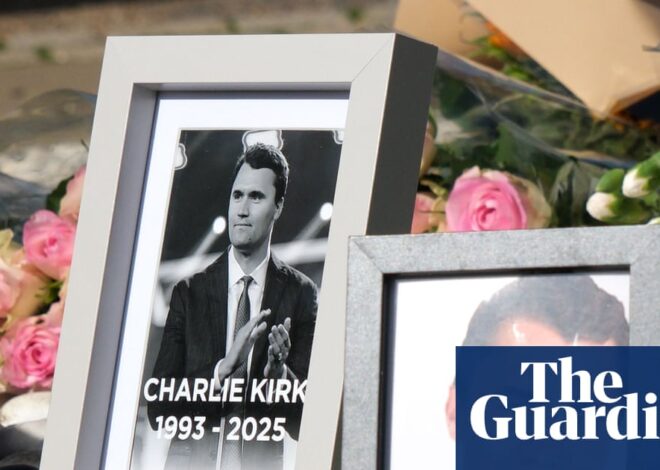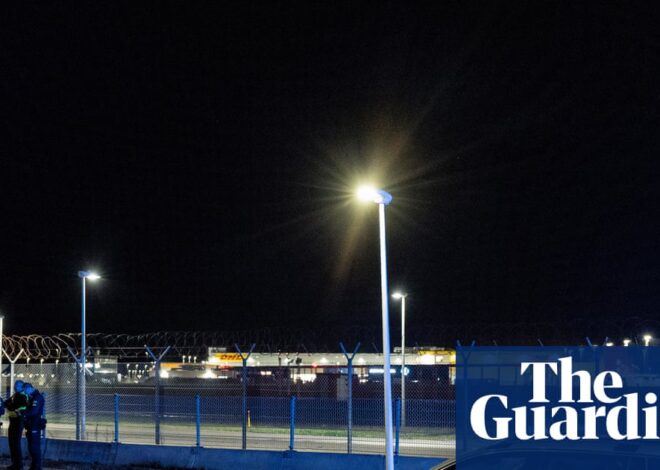
Russian violation of Estonian airspace brings region ‘closer to conflict’, foreign minister says – Europe live | Russia
Russian provocations represent ‘destabilising escalation’ that brings region ‘closer to conflict than at any time in recent years,’ Estonia’s foreign minister says
Flanked by foreign ministers and senior diplomats from other countries, Estonia’s Tsahkna reads out a statement on behalf of 50 countries and the EU condemning the incident in which three Russian fighter jets violated Estonian airspace last week.
He says it was “a dangerous escalation,” and “the fourth violation of Estonia’s airspace by Russia this year.”
“We are here today because this incident concerns not only Estonia, but the entire international community,” he says.
He warns its “part of the wider pattern of Russian provocations against its neighbours.”
“Russia’s reckless actions represent not only a breach of international law, but also a destabilising escalation that brings the entire region closer to conflict than at any time in recent years,” he stresses.
He urges Russia to “cease, without delay, its war of aggression against Ukraine,” and to “end all provocations and threats against its neigbhours’ sovereignty and territorial integrity.”
Key events
-
‘Three is a pattern,’ Greek foreign minister says of Russian repeated violations of EU airspace
-
‘Russia’s neighbours, not unreasonably, fear they could be next’ after Ukraine, Danish FM says
-
We can’t risk for this situation to ‘spiral out of control,’ senior UN official warns
-
Russian provocations represent ‘destabilising escalation’ that brings region ‘closer to conflict than at any time in recent years,’ Estonia’s foreign minister says
-
UN security council meeting on Russian jets over Estonia to begin shortly
-
Germany’s response to Gaza prompts questions about its relations with Israel
-
German chancellor Merz’s absence at UN general assembly on Palestine prompts questions
-
Thousands protest in solidarity with Gaza on second day of Italian strikes
-
Disruption of European airports confirmed as ransomware attack, ENISA says
-
Poland ready to shoot down objects violating its airspace, PM says, but signals caution when violations are not clearcut
-
‘Irrefutable evidence’ of Russian violation of Estonian airspace, diplomat says
-
Kremlin denies violating Nato airspace, accuses Estonia of ‘escalating tensions’
-
Flight delays continue across Europe after weekend cyber-attack
-
Nato ambassadors to meet for talks on Russian jets in Estonia on Tuesday
-
Russian provocation in Estonia ‘part of pattern of unacceptable behaviour,’ Estonian diplomat says
-
Morning opening: Growing concerns about Russian provocations in eastern Europe
‘Three is a pattern,’ Greek foreign minister says of Russian repeated violations of EU airspace
Greek foreign minister Giorgos Gerapetritis strikes a similar chord as he says:
“Reckless acts of this kind are not new, but their successive recurrence indicates they are not mere coincidences.
As the saying goes, once is an accident, twice is a coincidence, three is a pattern.”
He urges Russia to “cease these unlawful acts immediately and respect its obligations under international law,” as he notes that “it is evident this new escalation is a direct result of the Russia’s war in Ukraine.”
In a direct appeal to US president Donald Trump, he notes that “these [Russian] violations … contradict the spirit of the Anchorage meeting” with Putin.
‘Russia’s neighbours, not unreasonably, fear they could be next’ after Ukraine, Danish FM says
Danish foreign minister Lars Løkke Rasmussen opens the floor.
He says it was a “reckless and dangerous” violation of Estonian airspace, “penetrating 10 kilometer deep, north of Tallin.”
“Let there be no doubt: I condemn this latest violation of Estonia sovereignty and territorial integrity by Russia. Our support for Estonia remains steadfast,” he says.
He calls out Russian “escalations and provocations” which he says seek to “intimiate countries to stop supporting Ukraine and to test our resolve.”
“Russia clearly feels it can act with impunity in Ukraine, the Baltic Sea, the Black Sea, the whole of eastern Europe,” he warns.
But he says that “Denmark and its allies will not be provoked by Russia.”
“We have seen this playbook before the invasion of Georgia, the annexation of Crimea, the invasion of the Donbas, the full scale invasion of Ukraine. Russia’s neighbours, not unreasonably fear, they could be next,” he says.
“Therefore, we tell the Russian Federation today: step back, step back. Take another path. We will not allow [for] the unravelling of the European security architecture,” he says.
We can’t risk for this situation to ‘spiral out of control,’ senior UN official warns
We are now getting a bit more detail on the incident itself.
According to the Estonian Ministry of Defence, the incursion took place between 9:58 and 10:11am on Friday in the Gulf of Finland in the Baltic Sea, with three MiG-31 fighter jets entering Estonian airspace without permission, with transponders switched off, and with no flight plans.
Italian F-35 fighter jets were scrambled in response.
Presenting the case, UN assistant secretary general Miroslav Jenča notes that Russia denies entering Estonian airspace, but sets out the context of previous Russian violations of Polish and Romanian airspace, too.
He says “this series of recent incidents further underscored the already high tensions that endanger European security as the war continues to rage in Ukraine.”
“The world simply cannot afford such danger to spiral out of control, and for the devastating war in Ukraine to further escalate and expand,” he warns.
Apart from the Security Council members, Estonia, Germany, Latvia, Netherlands, Poland, Romania, Sweden, Ukraine are also invited to join today’s meeting.
EU’s foreign policy chief Kallas is also joining.
The main meeting is about to start shortly as ministers move towards the security council chamber.
You can watch it below, but I will bring you the key lines here.
Russian provocations represent ‘destabilising escalation’ that brings region ‘closer to conflict than at any time in recent years,’ Estonia’s foreign minister says
Flanked by foreign ministers and senior diplomats from other countries, Estonia’s Tsahkna reads out a statement on behalf of 50 countries and the EU condemning the incident in which three Russian fighter jets violated Estonian airspace last week.
He says it was “a dangerous escalation,” and “the fourth violation of Estonia’s airspace by Russia this year.”
“We are here today because this incident concerns not only Estonia, but the entire international community,” he says.
He warns its “part of the wider pattern of Russian provocations against its neighbours.”
“Russia’s reckless actions represent not only a breach of international law, but also a destabilising escalation that brings the entire region closer to conflict than at any time in recent years,” he stresses.
He urges Russia to “cease, without delay, its war of aggression against Ukraine,” and to “end all provocations and threats against its neigbhours’ sovereignty and territorial integrity.”
Tsahkna is making his comments now, surrounded by the EU’s foreign policy chief and former Estonian prime minister Kaja Kallas, and numerous foreign leaders, including Ireland’s foreign minister Simon Harris.
UN security council meeting on Russian jets over Estonia to begin shortly
The UN security council meeting, requested by Estonia, is set to begin at the top of the hour, and we are expecting to hear from the country’s foreign minister Margus Tsahkna very shortly.
I will bring you the key lines from the statement here.
Germany’s response to Gaza prompts questions about its relations with Israel

Kate Connolly
in Berlin
But it is not that Israel’s offensive on Gaza has not sparked huge outrage and condemnation in Berlin. Far from it.
This has been growing over the past few months and led to division even within Merz’s own conservatives, who take their historical responsibility towards Israel especially seriously and some of whom were outraged about restrictions the chancellor recently put on weapons shipments to support the Israeli government.
But Germany’s relationship with Israel remains unique, due to its overwhelming responsibility for the Holocaust in which six million Jews were slaughtered by the Nazis. Israel’s right to exist and its security, it is repeatedly stressed, are anchored in Germany’s own Staatsräson, or reason of state/reason of being.
This is the line the German federal government has emphasised for decades and continues to reiterate whenever its caution over criticising Israel is questioned, even as constitutional experts have increasingly been stressing that this historical responsibility does not and cannot mean unconditionally supporting Israel in everything it does.
In an in-depth report on the subject on public broadcaster DLF, Daniel Marwecki of the University of Hong Kong, who has written a book on the topic called ‘Whitewashing and Statebuilding’, talks of the growing recognition in Berlin that continuing to support the government of Benjamin Netanyahu in particular over his war on Gaza is also in danger of leading to the growing international isolation of Germany and that it will therefore Berlin will be forced sooner rather than later into considering whether it should continue to do so.
In the same broadcast, Ofer Waldman, head of the Heinrich Böll Foundation’s Tel Aviv office, stressed that Germany was learning to recognise that its close relationship with Israel, nurtured slowly over decades, also brought with it a special responsibility to be able to advise Israel in matters related to its own interests.
While acknowledging it was not easy for Germany, carrying as it does the weight of its guilt for the crimes of the Nazi era, to criticise Israel, Waldman said in the context of the current course of action leading Israel into at best “a dead end” at worse “an abyss”, it was relevant and appropriate to ask: “does a true act of friendship and solidarity”, not actually also mean “being able to say to Israel, ‘not like this’?”.
Merz’s non-attendance at the UNGA might also jeopardise Germany’s candidacy for a seat on the Security Council, for which it is effectively competing against Austria and Portugal.
The leaders of those countries will be present and lobbying for votes. This seat will ensure that Germany continues to have a relevant place at the table not just on Palestinian issues, but many other pressing matters.
German chancellor Merz’s absence at UN general assembly on Palestine prompts questions

Kate Connolly
in Berlin
The absence of Friedrich Merz this week from the UN general assembly at which recognising Palestine as a state is the central focus might not be headline news but both in Germany and beyond it is very much being commented on.
Around 150 states have already agreed to recognise the state, with several more expected to sign up this week. Germany, it is clear, will not be among them.
The decision of Germany’s fledgling leader to stay away from the New York gathering is being seen as inextricably entwined in the business at hand, even as Merz and his government advisers are insisting it has far more to do with pressing budgetary deals he needs to preside over in Berlin.
Instead, Merz has sent his foreign minister Joe Wadephul even as he will have to interrupt his visit to fly back to Berlin for Wednesday’s budgetary vote in the Bundestag (which incidentally also includes Germany’s 576 million fee for UN membership) before heading back to NYC where he is due to speak to the UNGA on Saturday (by which time many state leaders will already have departed and there will probably be much less media interest.)
Word on the ground in Berlin is, that had he wanted to, Merz could have been flown to NYC today and back in time for Wednesday’s vote, even at short notice. Even the UN could still have found a respectable speaking slot for him, according to insiders.
While Britain, Canada and Australia have announced they are preparing to recognise Palestine as a state, Germany (and Italy) say that they believe recognition to be wrong at this point in time.
Europe’s division on this is not seen to be at all helpful in terms of trying to negotiate a long-term peace agreement.
Shortly before boarding his plane on Monday morning, Wadephul said Germany did not rule out recognising a state, but said: “For Germany the recognition of a Palestinian state is more likely at the end of the process,” adding: “such a process must begin now.”
At the same time he stressed Germany’s demands for a negotiated two-state solution, “even if this is far from reach right now.”
Thousands protest in solidarity with Gaza on second day of Italian strikes
Elsewhere, cities across Italy saw pro-Palestinian protests, strikes and blockades today, responding to calls from unions to “denounce the genocide in Gaza” and for diplomatic and economic sanctions against Israel, AFP reported.
More than 20,000 people gathered in front of Rome’s central station to protest against the worsening humanitarian crisis in Gaza, AP reported.
There were also protests in northern cities Milan and Turin, the central city Florence and southern cities Naples, Bari and Palermo.
Dockworkers in Genoa and Livorno in the centre-north blocked the ports, according to Italian news agencies.
Disruption of European airports confirmed as ransomware attack, ENISA says
The European Union Agency for Cybersecurity, or ENISA, just said that the cyberattack that disrupted several European airports (11:45) has now been confirmed to be a ransomware attack.
Poland ready to shoot down objects violating its airspace, PM says, but signals caution when violations are not clearcut
Meanwhile, Poland’s prime minister Donald Tusk warned that Poland would not hesitate and shoot down any objects that “violate our territory and fly over Poland.”
But he cautioned that it would take a more cautious approach to situations that are not clearcut, Reuters reported.
“We will take the decision to shoot down flying objects when they violate our territory and fly over Poland – there is absolutely no discussion about that,” Tusk told a news conference.
“When we’re dealing with situations that aren’t entirely clear, such as the recent flight of Russian fighter jets over the Petrobaltic platform – but without any violation, because these aren’t our territorial waters – you really need to think twice before deciding on actions that could trigger a very acute phase of conflict,” he added.
Tusk said that he would also need to be certain that Poland would not be alone if a conflict started to escalate, Reuters stressed.
“I also need to be absolutely certain… that all allies will treat this in exactly the same way as we do,” he said.
‘Irrefutable evidence’ of Russian violation of Estonian airspace, diplomat says
Estonia’s senior diplomat Jonatan Vseviov, quoted earlier (10:38), also commented on Russian claims that its jets had not violated Estonian airspace in his interview this morning.
In comments reported by Estonian public broadcaster ERR, he said:
“We have irrefutable evidence of this, and not just us, but all of our allies. This evidence exists. The fact that Russia is provocatively and dangerously violating the airspace of a Nato country is one thing. The fact that it is openly lying to the whole world about it is another.”
Kremlin denies violating Nato airspace, accuses Estonia of ‘escalating tensions’
Meanwhile, the Kremlin accused Estonia of falsely claiming that its military jets had violated its airspace on Friday, alleging without any evidence that it was trying to raise tensions.
Asked about that assertion, Kremlin spokesman Dmitry Peskov said Moscow had not heard Estonia say it had evidence to back up its accusution.
“We consider such statements empty, unfounded, and a continuation of the country’s utterly unstoppable policy of escalating tensions and provoking a confrontational atmosphere,” Peskov told reporters, as quoted by AFP.
Russian pilots always operated in accordance with international law, he claimed in comments reported by Reuters.
Flight delays continue across Europe after weekend cyber-attack

Lauren Almeida
Elsewhere, passengers are facing another day of flight delays across Europe, as big airports continue to grapple with the aftermath of a cyber-attack on the company behind the software used for check-in and boarding.
Several of the largest airports in Europe, including London Heathrow, have been trying to restore normal operations over the past few days after an attack on Friday disrupted automatic check-in and boarding software.
The problem stemmed from Collins Aerospace, a software provider that works with several airlines across the world.
The company, which is a subsidiary of the US aerospace and defence company RTX, said on Monday that it was working with four affected airports and airline customers, and was in the final stages of completing the updates needed to restore full functionality.
Airports in Brussels, Dublin and Berlin have also experienced delays. While kiosks and bag-drop machines have been offline, airline staff have instead relied on manual processing.
Nato ambassadors to meet for talks on Russian jets in Estonia on Tuesday
Separately, Nato ambassadors will meet to discuss the violation of Estonian airspace on Tuesday, AFP reported.
The meeting, convened after Estonia triggered the Article 4 procedure for emergency discussions, will give ambassadors a chance to discuss the alliance’s response to the incident.
Russian provocation in Estonia ‘part of pattern of unacceptable behaviour,’ Estonian diplomat says
Senior Estonian diplomat Jonatan Vseviov warned that last week’s Russian incursion was “part of a pattern of unacceptable behaviour, not an isolated event.”
“Recent weeks have seen repeated air and drone incidents in the region, all happening on the background of Russia’s illegal war of aggression in Ukraine.”
Vseviov, Estonia’s former ambassador to the US, also urged Europe to respond strongly, saying that “the fact of the incursion shows our previous messaging has not been clear or credible enough to change the reckless behaviour we face.”
“Our purpose is defensive clarity. If lines are blurred, they must be redrawn – decisively and together. That’s what we’ll aim to do in the coming days.”
On Monday, he went further telling Estonian media that it was necessary to make the consequences of the incident “sufficiently unpleasant consequences for Russia, so that it doesn’t come to this airspace next time.”
Morning opening: Growing concerns about Russian provocations in eastern Europe

Jakub Krupa
The UN security council will meet today to discuss the widely condemend Russian fighter jets incursion into Estonian airspace on Friday.
It will be the second time in 10 days that it meets to discuss Russia’s increasingly aggressive posture in the region, after Poland called the first meeting over Russian drones in its airspace.
“The issue is that Russia, a permanent member of the Security Council, has very blatantly violated the principle of territorial integrity, is behaving aggressively in the same way more broadly, and this is not a one-time incident,” Estonia’s foreign minister Margus Tsahkna told Postimees.
But over the weekend, another Russian aircraft was detected flying over the Baltic Sea without a flight plan, prompting a reaction from Nato allies, Germany and Sweden.
The incidents raised further questions about Russia’s plans for the region.
Posting on Facebook, Latvia’s president, Edgars Rinkėvičs, said there was a risk of “serious conflict” if Russia continued in the coming weeks to provoke Nato. European governments did not want a wider war but had no choice but to respond, he said.
Rinkėvičs added: “Russia is doing just enough to make it seem like it is not going too far. But, knowing both the logic of thinking in Russia and the frequent incompetence at various levels, this [a conflict] could happen. The responsibility will lie with the Kremlin.”
The Czech president, Petr Pavel, called on Nato to respond decisively to Russian aggression and to stay united. “Unfortunately, this is balancing on the brink of conflict, but giving in to evil is simply impossible,” he said.
Over the weekend, US president Donald Trump told reporters he “didn’t like” what happened in Estonia, but did not elaborate on the latest intelligence he received about the incident.
But asked by a Lithuanian reporter, he confirmed he “would” help defend the Baltics and Poland if they were attacked by Russia.
Let’s see what we hear at the UNSC meeting today.
Separately, a number of European countries moved to recognise the Palestinian state over the weekend, with the UK leading the pack, but also other countries, like Portugal, making the call. It’s France’s turn today, with Emmanuel Macron expected to make the announcement in late afternoon.
It will be a busy day, but I will bring you all the key updates here.
It’s Monday, 22 September 2025, it’s Jakub Krupa here, and this is Europe Live.
Good morning.


